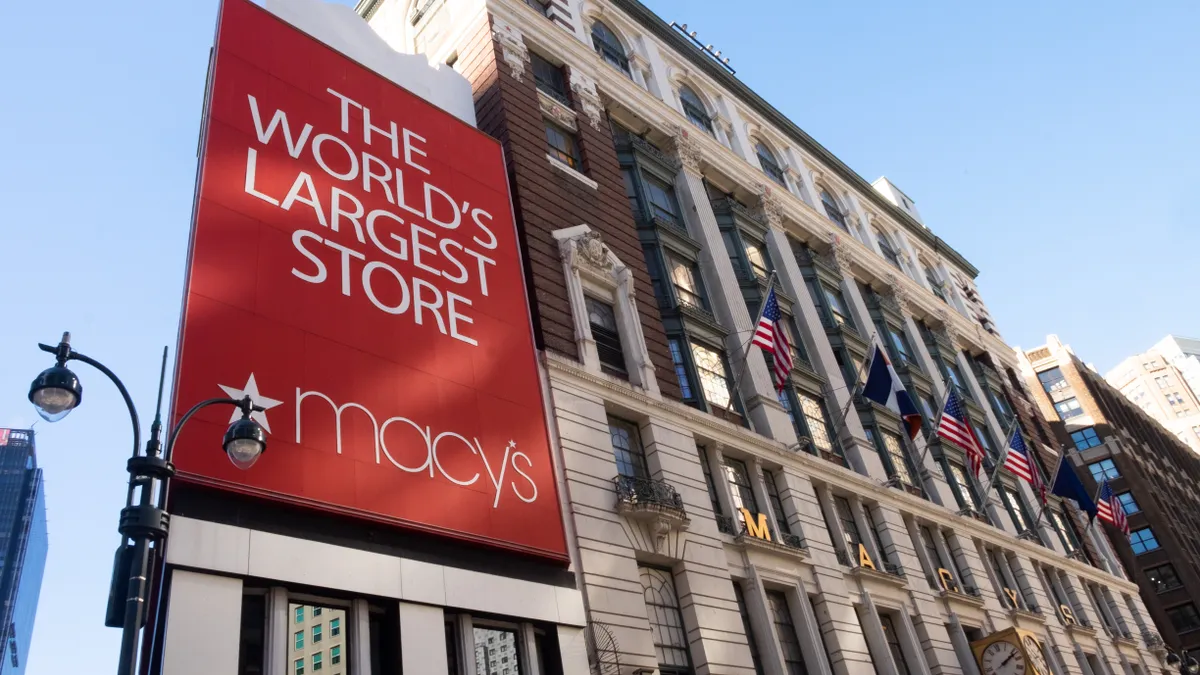Dive Brief:
-
Two major Macy’s investors, Arkhouse and Brigade Capital, are in talks to take the department store private, offering $21 per share or $5.8 billion, The Wall Street Journal reports.
-
The firms already have the ability to raise the required financing, and may be willing to increase their offer, per the report. “We are declining to comment at this time,” a Macy’s spokesperson said by email.
-
A spokesperson for Arkhouse, a real estate investment firm that “takes a private equity approach,” declined to comment. A spokesperson for Brigade Capital, a specialist in credit investment strategies, also declined to comment.
Dive Insight:
With some 500 stores — mostly mall anchors as well as downtown flagships like those in New York City, Chicago and San Francisco — Macy’s real estate holdings are formidable.
They’ve attracted attention before: Activist fund Starboard Value began agitating for a real estate play in 2015, before giving up two years later. At that time, Starboard founder and CEO Jeff Smith said that the firm bought into Macy’s “too early” and that it had grown impatient with the retailer, which was reluctant to develop an aggressive real estate play as seen at Sears Holdings Corp. and Saks Fifth Avenue parent Hudson’s Bay Co.
Some analysts see the most recent move as credible, if unconfirmed, though UBS analysts led by Jay Sole noted in a client note Sunday that Macy’s is probably not worth $21 per share “due to ongoing share loss to Off-Price retailers and other competitors.”
“However, what matters is the investor group sees value in [Macy’s] and/or its real estate,” they said.
Macy’s real estate could be worth $5 billion to $7 billion, significantly less than the estimates put forth by the activist investors of 2015, who had floated $21 billion, according to Evercore ISI analysts led by Michael Binetti. GlobalData analysts similarly peg Macy’s real estate portfolio at $6 billion, calling that conservative.
Previous investor estimates of Macy’s holdings have not materialized. In recent years, Macy’s sold its San Francisco men’s store for $250 million, its Minneapolis flagship for $59 million, a portion of its Chicago Loop flagship for $27 million and its Pittsburgh flagship for $15 million, which dismantled Starboard’s valuation, Evercore said. Those analysts say Macy’s Herald Square flagship could fetch $900 million to $1.5 billion, though warned that “department store valuations have been prone to significant variability.”
Nick Egelanian, president of retail development firm SiteWorks, said that it is inevitable that firms will try to take full advantage of Macy’s assets, considering its massive expansion decades ago.
“This is a logical step in the 50- or 60-year deconstruction of the mall model,” he said by phone. “Think about it. Macy's is a collection of what once was about 100 different department stores. It's the collector of all the junk. They've been operating as a retail chain, but closing stores and occasionally monetizing the stores. But generally, they've had no strategy. And the worst of it goes back to Terry Lundgren, who promoted himself as a retail genius, and was nothing but a retail dope.”
Egelanian and GlobalData Managing Director Neil Saunders say that the real estate value casts such a large shadow because Macy’s is faltering as a retailer. If it goes private under the ownership of firms focused on its property, its prospects will likely dim, Saunders said. A new management team under incoming CEO Tony Spring is in “a tight corner,” he said in emailed comments.
“As critical as we are of Macy’s current management, they are at least focused on trying to run the business as a retailer,” he said. “An investor group that sells off real estate and perhaps takes other actions such as spinning off the ecommerce business, would certainly make some short-term gains. But unless some of those profits were reinvested in revitalizing the core retail business, it would leave Macy’s in the worst of all worlds.”
Editor’s note: This story has been updated to include communication from Brigade Capital.














